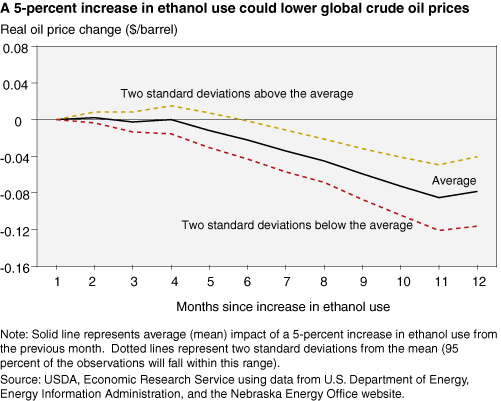U.S. Ethanol Dampens Global Crude Oil Prices
- by Lihong McPhail
- 12/1/2011
Ethanol is the world's most widely used liquid biofuel in the transportation sector. A recent ERS study found that increasing ethanol in the U.S. gasoline supply would lead to lower crude oil prices than would otherwise have been the case. A one-time 5-percent increase in U.S. ethanol use will lower the crude oil price by an estimated 8 cents per barrel over 12 months.
The U.S. is the world's largest ethanol producer and currently holds a 57-percent share of global ethanol production. In 2010, about 13 billion gallons of ethanol were blended into the U.S. gasoline supply, accounting for about 9.5 percent of gasoline consumption. The Renewable Fuel Standard (RFS) established by the Energy Independence and Security Act (EISA) of 2007 mandates annual use of 36 billion gallons of renewable fuel in the U.S. by 2022. If the RFS is met, ethanol's share of U.S. gasoline consumption could reach 25 percent within the next 10 years.
The impact of U.S. ethanol use on crude oil markets will become important as the portion of gasoline blended from ethanol grows from its current level of around 10 percent to the RFS level of 25 percent by 2022. Given the role that petroleum prices can play in economic growth prospects, global economic forecasts should take into account the outlook for the U.S. ethanol industry because of its effect on crude oil prices. Fluctuations in crude oil prices affect global consumption, production, and trade patterns. Abnormally high prices can contribute to downturns in the world economy.
This article is drawn from:
- 'Assessing the Impact of U.S. Ethanol on Fossil Fuel Markets: A Structural VAR Approach'. (2011). Energy Economics. 'Assessing the Impact of U.S. Ethanol on Fossil Fuel Markets: A Structural VAR Approach,' by Lihong Lu McPhail, in Energy Economics, April 2011..
You may also like:
- Bioenergy. (n.d.). U.S. Department of Agriculture, Economic Research Service.
We’d welcome your feedback!
Would you be willing to answer a few quick questions about your experience?


